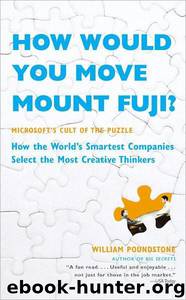How Would You Move Mount Fuji?: Microsoft's Cult of the Puzzle - How the World's Smartest Companies Select the Most Creative Thinkers by William Poundstone

Author:William Poundstone
Language: eng
Format: azw3, mobi
Tags: Self-Help
ISBN: 9780759528024
Publisher: Little, Brown & Company
Published: 2003-05-01T00:00:00+00:00
[Link to Answer 52] Does the sun always rise in the east?
[Link to Answer 53] You’ve got six matchsticks. Arrange them so they form four equilateral triangles.
The first is a “trick question.” It has a simple, clever answer. That’s the problem. Once you hear the clever answer, you’ll remember it for a long time. This riddle has been making the rounds, by word of mouth, print, and the Net, for years. There are many places a job candidate could have heard this puzzle and its solution. How do you know whether the candidate has heard it before? You don’t, of course, and this isn’t the sort of riddle where thinking out loud is especially informative.
Much the same goes for the matchstick puzzle. It has a further problem: It’s too hard to ask on a hiring interview. That will strike some interviewers as a peculiar objection when the goal is to hire extremely bright people for a demanding technical job. But this is not the Mensa Quiz for Super-IQ Brains. There is not time to ask everything that might tell you something worthwhile. Not enough people solve this puzzle within a reasonable time to make it worth your while to ask it.
The matchstick question hinges on a paradigm shift. When you make the reasonable assumption that you are going to lay the six matchsticks out on the table and arrange them in the many ways possible, you can continue, logically and efficiently, for some time without solving the problem, and without exhausting the possibilities of the paradigm. Because there are so many possibilities to play around with, you do not necessarily find yourself backed into a corner (which might prompt the paradigm shift needed to get the right answer).
This is considered an especially successful puzzle because the solution is simple and audacious. But since the puzzle is hard, and the answer simple, it may well be that more candidates “solve” it by remembering the answer than by truly figuring it out in the interview. That renders the question useless for hiring purposes.
Before you pose any question to a job applicant, you ought to ask yourself two questions:
Download
How Would You Move Mount Fuji?: Microsoft's Cult of the Puzzle - How the World's Smartest Companies Select the Most Creative Thinkers by William Poundstone.mobi
This site does not store any files on its server. We only index and link to content provided by other sites. Please contact the content providers to delete copyright contents if any and email us, we'll remove relevant links or contents immediately.
| Business School Guides | GMAT |
| Guides | Interviewing |
| Job Hunting | Job Markets & Advice |
| Resumes | Vocational Guidance |
| Volunteer Work |
The Motivation Myth by Jeff Haden(5206)
Audition by Ryu Murakami(4923)
Adulting by Kelly Williams Brown(4566)
The Confidence Code by Katty Kay(4251)
A Mind For Numbers: How to Excel at Math and Science (Even If You Flunked Algebra) by Barbara Oakley(3302)
Waiting in the Wings by Melissa Brayden(3215)
Self-Esteem by Matthew McKay & Patrick Fanning(3141)
Fooled by Randomness: The Hidden Role of Chance in Life and in the Markets by Nassim Nicholas Taleb(3108)
The ONE Thing by Gary Keller(3066)
Nice Girls Don't Get the Corner Office by Lois P. Frankel(3043)
The Dictionary of Body Language by Joe Navarro(2992)
How to be More Interesting by Edward De Bono(2789)
Designing Your Life by Bill Burnett(2741)
Getting Things Done by David Allen(2691)
The Plant Paradox by Dr. Steven R. Gundry M.D(2611)
Police Exams Prep 2018-2019 by Kaplan Test Prep(2540)
What Color Is Your Parachute? 2015 by Richard N. Bolles(2306)
Dangerous Personalities by Joe Navarro(2283)
When to Jump by Mike Lewis(2239)
